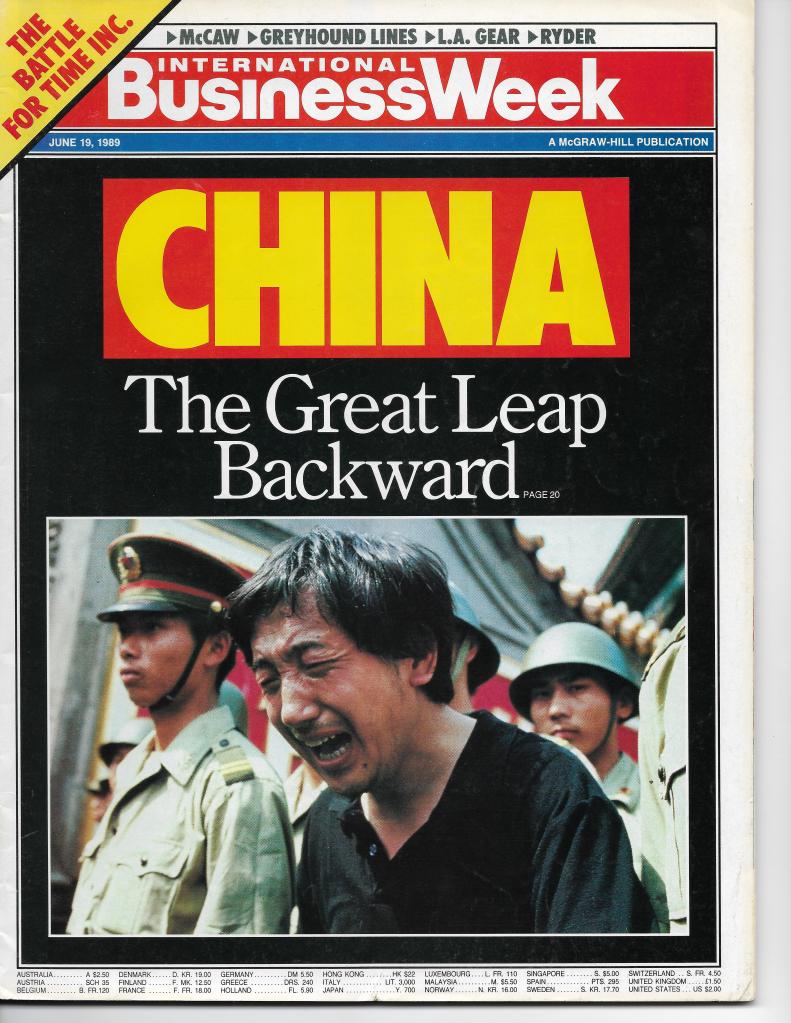Publisher’s Note: Please see note following Dori’s Guest Blog explaining the interruption of regular blogging in Q4 of 2020 and the schedule for the resumption of regular blogging throughout the remainder of 2021,
Three Reassuring Perspectives on China
by Dori Jones Yang
These are dark times for any American who has spent years working to improve US-China relations. Some 80 percent of Americans have an unfavorable view of China, up from 47 percent just three years ago. After writing a memoir of my experiences as a BusinessWeek correspondent covering China during more hopeful times—the 1980s—I can offer three perspectives that offer some reassurance.
First, historical. As a child of the Cold War, I was taught that China had a totalitarian system where children were asked to spy on their parents. China was isolated, poor, and mired in destructive political struggles. I chose to study the Chinese language during the 1970s, and just as I completed my master’s degree in international studies, Washington and Beijing re-established diplomatic relations, setting off a decade of optimism. For eight years, I reported on Deng Xiaoping’s reform and opening, with ever more euphoric articles as Chinese people were finally given the freedom to speak up and take control of their lives.
By the time I completed my assignment, in 1990, the wheel had turned full circle. After Chinese troops suppressed the Tiananmen Square protests, US-China relations went dark again, with US sanctions over human rights violations. We reporters, we Americans, predicted a “great leap backward”—the end of Deng’s great experiment in modernization.
But we were wrong, and China embarked on a steady path of rapid growth that enabled 850 million people to rise out of poverty. Chinese cities gleamed with new subways, high-speed rail lines, skyscrapers, shopping malls, and neon advertising. Many US companies profited from China’s low-cost manufacturing and ever-expanding market. Yet I, like many, was caught unawares, again, when US-China friendship turned combative and confrontational during the Trump years.
My historical perspective is this: Americans are passionate about China. Unlike India, or Indonesia, or Brazil, China evokes strong feelings in these United States. Even people who have never set foot on the Great Wall express strong opinions about the Middle Kingdom. We love it. We hate it. Then we love it again. As John Pomfret wrote in The Beautiful Country and the Middle Kingdom, “Both sides experience rapturous enchantment begetting hope, followed by disappointment, repulsion, and disgust, only to return to fascination once again.”
Second, I view China through the lens of business. As a BusinessWeek reporter, I wrote about the early pioneers, American companies that dared to invest in China just as Beijing was starting to allow foreign trade and investment. I interviewed some of the earliest Chinese pioneers, too, entrepreneurs who defied their fears of being labeled “capitalist roaders” and started their own companies. During the 1990s and beyond, US corporations were the strongest advocates for China, pushing the US government to grant China most-favored-nation trade status and then championing China’s entry into the World Trade Organization. In recent years, some US companies turned to the Trump Administration to help pressure Beijing to remove barriers, not necessarily realizing that the result would be a decline in the overall relationship—mistrust and a push for China to become self-reliant.
Today, some of those companies regret their support of Trump’s tariff war. Those that view China as a major market and an important supplier—and the one major economy that is actually growing again—are likely to speak up again in support of better relations. Even those in industries that view China as a competitor are torn, because China is also a huge market for them. Few, if any, US companies benefited from the trade war, and business support for it is likely to fade.
Third, I have a personal perspective on China. During my years as a reporter there I met and married a Chinese man—one who had fled the Communists as a child but who later benefited from selling US equipment to China’s rapidly growing market. Through him, I came to know a wide range of individuals in China who were able to better their lives because of new opportunities. Sadly, these people-to-people contacts that I and other Americans have forged with Chinese individuals are now more difficult to maintain. The pandemic forced us to cancel plans to travel to China last year, and our Chinese relatives in the United States fled back home to safety.
Yet hundreds of thousands of Chinese have studied at US universities, and millions have traveled here as tourists—and untold millions of Americans have come to know Chinese as friends. These interpersonal ties may help to keep the two nations from flying into enmity and to moderate the negative impressions citizens on both sides have of the other’s government. They help to humanize our understanding of China, and those of us who have such links should convey that to our American friends and neighbors who feel alienated from China.
After living through several swings of the pendulum, I have learned to be both patient and persistent. Over the past forty years, the United States and China have created strong ties that may pull us out of our current “repulsion and disgust” and return us to fascination once again.
—Dori Jones Yang is author of When the Red Gates Opened: A Memoir of China’s Reawakening.
For more information, see her website, https://dorijonesyang.com/when-the-red-gates-opened/.
For her National Committee on U.S.-China Relations webinar presentation, https://www.youtube.com/watch?v=XCbTTs6GshM&t=208s
Publisher’s Note: I offer heartfelt apologies to all followers of the TEA Collaborative Blog — and especially to Dori — for the unexpected and unexplained interruption of service which began in the 4th quarter of 2020 and continued through until today. Cryptically, all I can say at this moment is that the interruption had to do with the lead-up to the November 3rd election and then with efforts to help the new administration Build Back Better in the area of pandemic response along the NE Corridor. Hope to have more I can share in the near future. In the meanwhile, the resumption of regular blogging on our three themes — Technology, Energy/Environment, and (PRC macrodevelopment) Ambitions (spiced up occasionally with guest blog posts added as the opportunities present themselves) — will resume shortly. Again, apologies to Dori for this appearing so late after your book launch in September. Sending my wishes here for the book’s continued success!






1 comment
Comments feed for this article
March 31, 2021 at 4:01 pm
Eric Fang
Great perspective! Thanks.